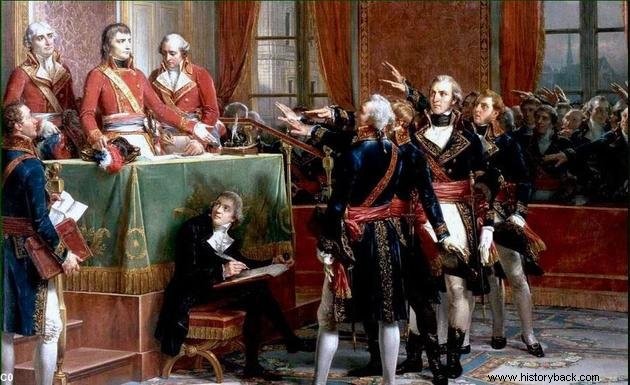The 18th of Brumaire was a coup d'état carried out by Napoleon Bonaparte, on November 9 and 10, 1799, in France.
What was the 18th Brumaire coup?
It was a political maneuver to ensure the rise of the Girondins, the French high bourgeoisie, to power.
It also served to contain the Jacobins, preserve the achievements of the French Revolution and stop the war with countries contrary to revolutionary ideals.
Through the coup, the system called Directory was overthrown and replaced by the Consulate. This fact marked the beginning of the dictatorship of General Napoleon Bonaparte (1769-1821).
The date gets its name because it occurred in the second month of the French Revolutionary Calendar, Brumaire, which was dedicated to the mist.
Background of the 18th Brumaire Coup
With the military conquests obtained by the French, the Army was strengthened more and more. Faced with the disagreements in the Directory between the various political factions, it seemed that the military would be the only ones capable of guaranteeing governability in France.
Likewise, the bourgeois saw their social and economic achievements threatened, as some groups wanted the return of absolutism. Likewise, there was a real danger of France being invaded again by the troops of the Second Coalition (England, Austria, Russian Empire, among others).
All this makes the French support the Coup of the 18th Brumaire and the dictatorship of Napoleon Bonaparte.
Bonaparte and the Coup of the 18th of Brumaire
Napoleon Bonaparte was one of the most outstanding soldiers of the revolutionary era, winning several countries that made war against France. He became more and more interested in politics and took a bad look at the era of Terror implanted by Robespierre.
In this way, he plans with the abbot Sieyès a coup to preserve the conquests of the French Revolution.
Thus, Napoleon deposed the Directory using a column of grenadiers and implanted the Consulate regime. In this system it was foreseen that three consuls would share the power:Bonaparte, Sieyès and Pierre-Roger Ducos.
New Constitution
The trio coordinated the drafting of a new constitution that established Napoleon as First Consul for a period of ten years.
The Magma Carta still granted him powers of dictator, as Bonaparte was responsible for appointing to the main public offices and also for legislating. In this new Constitution no reference is made to the Declaration of the Rights of Man and of the Citizen.
This document would be in force until 1804 when Napoleon himself creates the Empire and crowns himself sovereign.
Consequences of the 18th of Brumaire

With the Coup of the 18th of Brumaire, Napoleon Bonaparte establishes a dictatorship in France with the powers concentrated in his person.
In turn, Bonaparte tries to reconcile the various political factions. He re-establishes freedom of worship, gives amnesty to émigrés (nobles) who fled during the Revolution, promulgates the Civil Code, creates the Bank of France, etc.
However, it makes the Senate only a consultative body and does away with the election of judges that as had been determined by the revolutionaries.
The Consulate ends with the creation of the Napoleonic Empire, where a new dynasty, Bonaparte, comes to rule France.
See also:Napoleonic EmpireThe 18th Brumaire of Louis Bonaparte, by Karl Marx
The expression "18 Brumaire" became synonymous with a coup d'état within the revolutionary process.
The historian and writer Karl Marx entitled one of his works, "The 18th Brumaire of Louis Bonaparte", where he analyzed the political movements that took place in Europe between 1848-1851.
In this book, Marx explained how the nephew of General Napoleon Bonaparte, Louis, managed to restore the monarchy, despite being the president of the Republic, and proclaim himself emperor.
We have more texts on the subject for you :
- Napoleonic Era
- What is dictatorship?
- Napoleon Bonaparte
- French Revolution (summary)
